How Jasper the therapy dog is helping Lancashire's traumatised NHS frontline workers
and live on Freeview channel 276
It has been the most testing of years for the Rev David Anderson.
Nearly five years ago David changed jobs, switching from his role as vicar of St Lawrence and St Paul’s, Longridge, to become a hospital chaplain with the East Lancashire Hospitals Trust.
Advertisement
Hide AdAdvertisement
Hide AdHaving previously worked in a hospice he had honed his counselling skills. Now those skills have been deployed in the coronavirus pandemic.
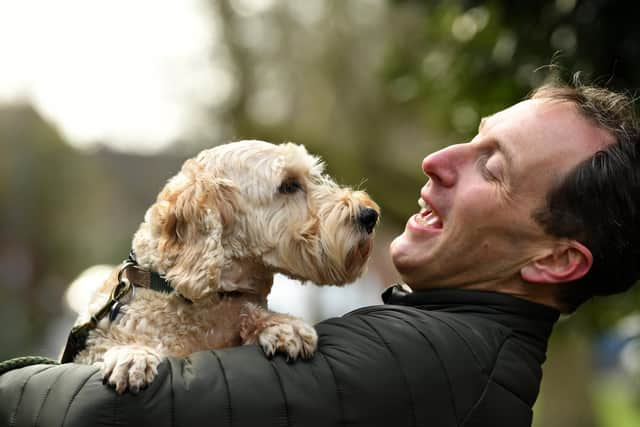

But he has not faced the crisis alone - his pet dog Jasper, a Cocker Spaniel and Poodle cross (Cockapoo), also has a role in the chaplaincy team - as a therapy dog.
Jasper and David have stepped up to meet one of the pandemic’s ongoing challenges - to provide solace and comfort to those on the front line of health care.
David meanwhile also continues to visit Covid wards to help patients, often in their final hours.
Advertisement
Hide AdAdvertisement
Hide AdThe duo’s work gained national recognition with the award of a BEM (British Empire Medal) to David after he set up “Conversations with Jasper” to allow hospital staff to talk through their experiences during the pandemic. He also helped establish a welcoming Oasis at each of the Trust’s spiritual care centres - a comfortable,welcoming and safe space for staff to reflect on their experiences.
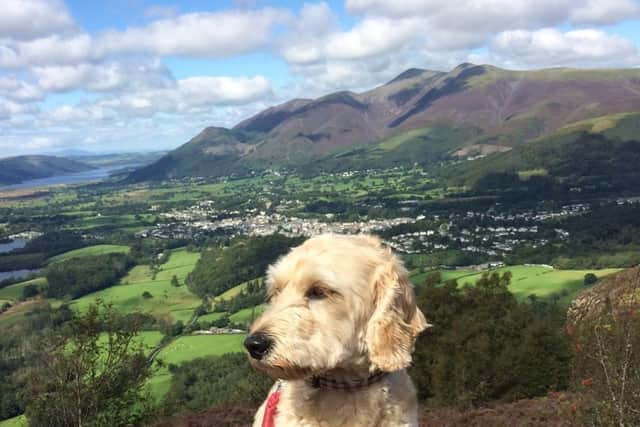

David also created an online course “Caring during Covid” for staff to help one another which has now been used by other health trusts. The 45-year-old said: “It’s about the importance of listening and acknowledging and not always trying to fix. What staff need is to just tell their story. Sometimes we just jump too quickly into fixing people before letting them hear their pain.”
Jasper and David's fame spread and they were asked to help switch on Blackpool lights (virtually) last year as ‘coronavirus heroes.’
David had first seen the powerful help a caring canine could provide when he first joined the ELT team and met a doctor who had a Labrador therapy dog. When the doctor left David wondered whether his puppy might fill that gap.
Advertisement
Hide AdAdvertisement
Hide AdAfter researching the idea and attending a short training course David set about training Jasper .He recalled: “It’s quite a long process getting him assessed for a hospital. He was assessed at home and in the community and twice in the hospital when working. One of the things was he found it hard if the floors were very slippery in the hospital!
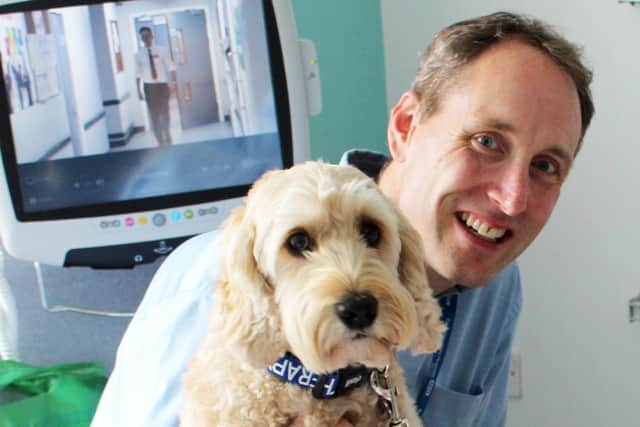

"He has been working for about two years - before Covid he used to go to visit patients on wards and staff could request visits. If a patient was at end of life or had very severe mental health problems or dementia we would often take Jasper to them to give some support.”
Jasper also helps conversations develop. David said: “Often people find it easier to talk while stroking the dog. It distracts them. It also makes them feel better and comfortable. I find they’ll talk to the dog - especially the teenagers. Before Covid I used to use him in the ICU (Intensive Care Unit).”
David recalled how they would put Jasper on a bed and previously seemingly oblivious patients would rouse, making the tiniest of, but very significant, efforts to reach to stroke Jasper.
Advertisement
Hide AdAdvertisement
Hide AdSimilarly Jasper had helped with physiotherapy sessions encouraging people to walk. He said: “Physiotherapists use him to encourage patients to do exercise...to stroke him and get more agile.”
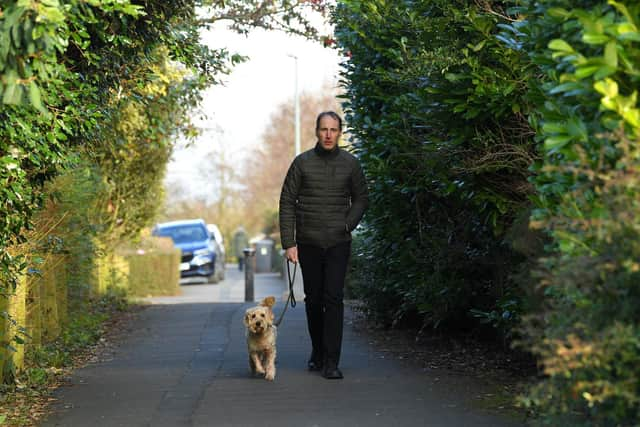

To those who needed encouragement to rebuild walking skills the suggestion might be made: “Why not walk with Jasper?”
When the pandemic started with the uncertainties over the transfer of the disease Jasper was placed on leave. But as more research was done it became apparent Jasper would still be welcome - but this time helping the staff only and not going on wards.
David said: “He just comes to see the staff now. My job has changed a lot now We do group counselling and one to one with staff, because a lot of our staff have been quite traumatised by what they’ve seen and experienced. Staff can come and talk about their experiences. Jasper helps support them. Jasper works two days a week normally, sometimes three if there are lots of staff sessions booked in to see him."
Advertisement
Hide AdAdvertisement
Hide AdJasper is a calm and placid dog who ,says David, is especially sensitive with cancer patients: "When Jasper is on a ward he goes up and sits down.When he’s not working he’ll run around and be a normal dog."
Jasper also helps David and his wife to relax. David particularly enjoys taking Jasper for a walk - and not having to wear a mask. He explained: "On Covid wards, I wear mask, face visor, gown and gloves. We also have to wear scrubs."
David's hospital duties include being on call two nights a week. The Trust has hospitals in Blackburn, Burnley and Clitheroe and currently David spends most of his time at Blackburn.
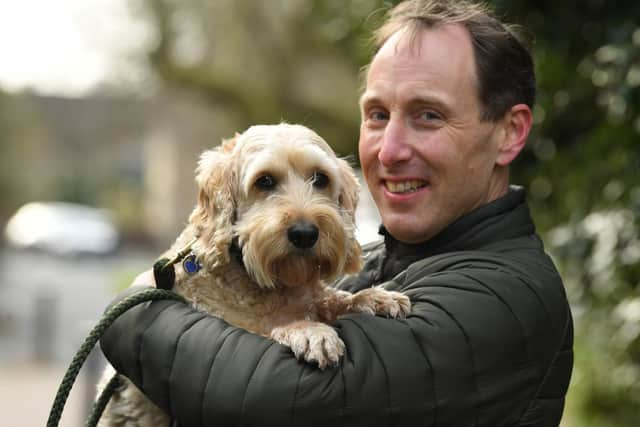

While staff can be used to traumas such as in accident and emergency, this trauma has been ongoing with staff getting no respite. Blackburn with Darwen has been one of the parts of the country particularly affected by Covid-19.
Advertisement
Hide AdAdvertisement
Hide AdDavid said: “What has been hard is the amount of death we have seen. We’ve had large numbers of people dying here. People in their 20s, 30s, 40s, especially in the second wave. We’ve had husbands and wives and grandparents and (their) children in hospital at the same time. Because families are only allowed in in the final moments we tend to get to know the patients a lot more. They haven’t got anyone else to talk to. We spend time supporting and listening. When they do die, it’s hard for staff to witness. Often they can deteriorate quite quickly. In our hospital we’ve lost colleagues as well...
“We do a lot of Zoom calls so people can say goodbye to their loved ones.It’s quite traumatic to hear the screams of grandchildren as they say goodbye."
He recalls how in one unit of four patients they had Zoom farewell calls for three patients in one afternoon: “We went from bed to bed.”
The fear of the fourth patient was understandable.
“If they ask what their chances are we have to be honest with them. We always have hope though and we never give up.”
Advertisement
Hide AdAdvertisement
Hide AdHe recalled how one patient had been well enough to have physiotherapy care in the morning and later that day David sat with him as he took his dying breaths.:”It’s not always pleasant as people die ... It’s been horrible, really horrible. We’ve been doing it for a year now. In a way I’m fortunate because I’m a counsellor, because of our registration we have to have counselling ourselves. I used to have it every month. I have increased it to have it every three weeks.”
The Trust’s spiritual care team share the work and David has stepped in do Zoom calls for Muslim families when the Muslim chaplain is not available and vice versa .He said: “We’re there for everybody. We care for their religious needs, we also care for their spiritual needs."
The scale of the changes and trauma facing so many hospital staff are indicated when David notes: "At the moment we’ve got play therapists from the children’s ward redeployed into intensive care.
“ I think if you ask most staff, most staff aren’t OK at the moment....We have to keep coming in. If we don’t come in there’s nobody else. If they don’t show up there’s no-one to care for these patients...Lots of people are struggling now. Lots of us are exhausted. A lot of people are finding it hard to sleep because of the memories of what they’ve seen.".
Advertisement
Hide AdAdvertisement
Hide AdHow has he coped? He acknowledged: “It’s been the hardest part of my ministry this past year. I don’t think you could say I’ve enjoyed my job this last year. It’s been awful. I believe that the church should be there and as Christians we should be there and I do believe God is in the worst places as well. That’s why as chaplains we should be there. Also I believe if you think there is nothing after this I think it would break you. My faith helps me to keep going and it gives me hope.”
Even with all the necessary precautions David is aware he is working in a high risk area and that impacts on life at home and in his personal and spiritual life. He has not been to his local church in Grimsargh for a year and said :”One of the hard things is I’ve had to make a decision not to go to my local church...it’s the longest period of my life I’ve never been to church. That’s been hard as well."
Apart from the personal hope which sustains him, David has another hope. He said: “I’m just part of a team here, everyone is amazing here. I’m working with lovely staff and it’s a great privilege. The NHS is an amazing organisation. My hope is that we look after the staff after this. It’s going to take us years to get over this.
“I’d say to people if you’ve got people who work in the NHS just look after them and remember when things get better it will still be there for them. We’ll wear the scars of this for our lives. Just give them the chance to know they are loved and they can share their stories when they are ready to.”
Advertisement
Hide AdAdvertisement
Hide AdWith the memories embedded NHS workers will, he says: “need looking after. They need some time.”
It will also, he stressed, be important to have somewhere where they can remember colleagues who have died and whom they have not yet had chance to grieve for.
* The Lancashire Post is more reliant than ever on you taking out a digital subscription to support our journalism. For unlimited access to Lancashire news and information online, you can subscribe here